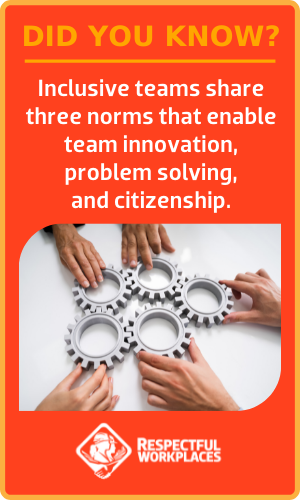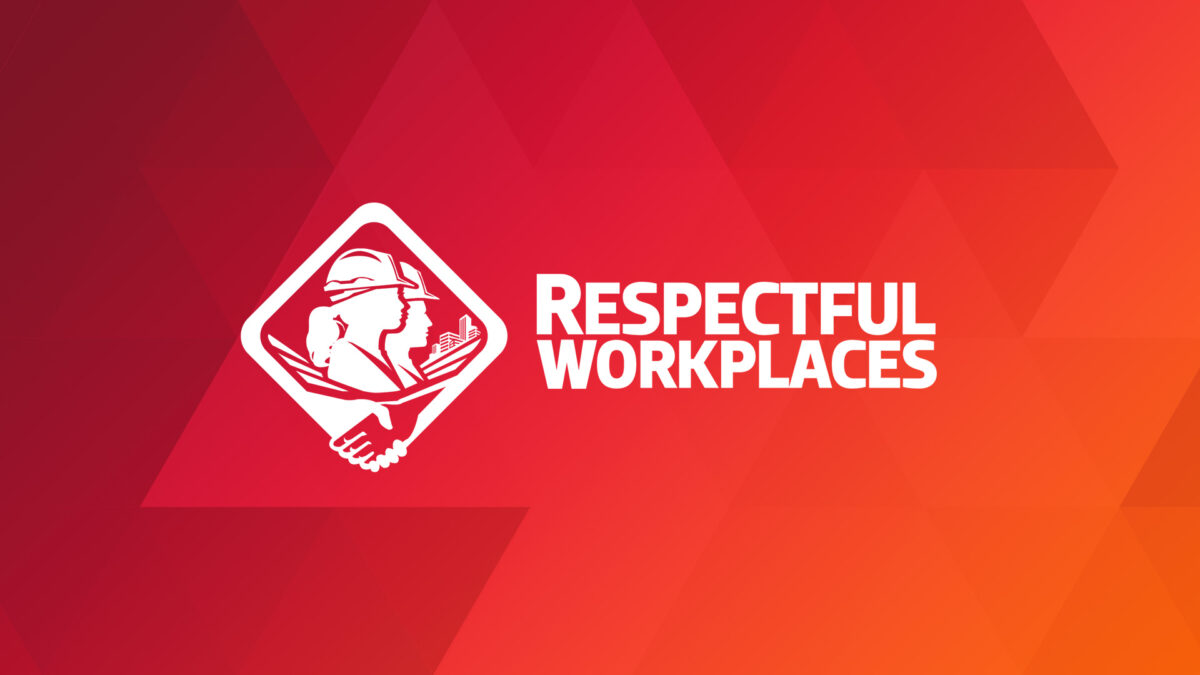Does your organization enable the team norms that promote team innovation, problem solving, and citizenship?

The future of work includes new frontiers in teamwork and collaboration that include hybrid and virtual work. According to Zippia.com, over the last 20 years, workplace collaboration has increased by at least 50%, and more than 50% of workers in the United States say their jobs rely on collaboration.
However, in order for teams to contribute their best, flourish, and succeed, leaders and team members must enable and support “inclusive team norms.” In today’s workplace, workers, especially millennials and Gen Zs, expect businesses to provide an inclusive workplace culture, help workers to be successful, and promote equity and social mobility.
In a study of more than 4,000 workers in over 14 countries, Catalyst found that teams that regularly practice inclusive team norms will outperform teams that do not.
Inclusive teams share three norms – the shared expectations for how team members should behave – that enable everyone to contribute, thrive, and have a sense of belonging:
- Promote expressions of difference: team members share and value dissenting opinions
- Foster a team coaching climate: team members provide constructive feedback and encourage one another to learn
- Codify fair team decision-making practices: teams have processes for fair, consistent, and principled decision-making
However, only 31% of white and 20% of ethnically or racially marginalized respondents reported “often” or “always” experiencing inclusive team norms at work.
The importance of enabling inclusive team norms
Enabling inclusive team norms is important because they significantly increase team innovation, problem solving, and citizenship.
Team innovation:
75% of workers who report high levels of inclusive team norms also report high levels of team innovation compared to 16% of those reporting low levels of inclusive team norms.
Team innovation is a worker’s view of the team’s ability to generate creative solutions for the development of new products, processes, or ways of doing work better. Team-based work relies on a diversity of skills and perspectives, but without an inclusive team environment, voices may be silenced and groupthink can dominate.
Team problem solving:
75% of workers who report high levels of inclusive team norms also report high levels of team problem solving compared to 16% of those reporting low levels of inclusive team norms.
Team problem solving is a worker’s view of how constructively their team works together to find solution and resolve conflicts. Teams today are faced with increasingly complex problems. Inclusive team norms enable teams to be bold, explore unpopular ideas, and take risks with the support of their team behind them.
Team citizenship:
77% of workers who report high levels of inclusive team norms also report high levels of team citizenship compared to 17% of those reporting low levels of inclusive team norms.
Team citizenship is a worker’s view of how common it is for team members to go above and beyond their own responsibilities to meet work group objectives. When high levels of team citizenship exist, team members act in the interest of the collective good, such as volunteering to work outside normal responsibilities to support another colleague.
How leaders and team members can enable inclusive team norms
1. Promote expressions of difference:
- Encourage perspectives that may counter the status quo:
- Designate a rotating “noble adversary” role during problem solving.
- Challenge either/or thinking:
- For each claim or idea, ask, “are there other ideas or perspectives that may also be true and important to include?”
- Seek everyone’s perspective when problem solving:
- Minimize the out-group/in-group dynamics that influence whose perspectives are listened to and whose are overlooked.
2. Foster a team coaching climate:
- Make team coaching a goal tied to performance reviews:
- Reward and standardize the practice as a valuable and necessary aspect of team and individual success.
- Acknowledge that mistakes are inevitable and a critical component of growth and learning:
- Create an environment of trust where team members back one another. (Please see blog #59 for a discussion of trust.)
- Encourage and respect the qualities that make each team member unique:
- Maintain a shared document that lists team members’ unique skills as a resource for a given topic or project.
3. Codify fair team decision-making practices:
- Develop a set of clear, written guidelines for team decision-making:
- Be sure to revisit and revise regularly to ensure inclusion and efficiency.
- Prioritize fairness and consistency:
- Note whether certain team members are not contributing to decision-making or whose ideas seem to be getting lost.
- Ensure that every member knows how team decisions will be made and how to correct errors in decision-making.
In today’s workplaces, collaboration is more important than ever. Yet the majority of workers do not experience inclusive team norms that help them to contribute their best, flourish, and succeed. By understanding and enabling inclusive team norms, leaders and managers can reverse this trend and increase team innovation, problem solving, and citizenship.
For organizations that want to promote an inclusive workplace culture, where inclusive team norms thrive, the online courses Introduction to Understanding Systemic Racism: A Guide for Leaders and Managers and Working in a Respectful and Inclusive Workplace provide guidance on enabling inclusive team work, communication and dynamics.
The BuildForce Respectful and Inclusive Workplace Toolkit provides a suite of tools based on the proven practices of respectful and inclusive organizations:
- Online Self-Assessment Tool
- Policy Framework and Implementation Guide
- Working in a Respectful and inclusive Workplace online course
- Introduction to Understanding Systemic Racism – A Guide for Leaders and Managers online course
For more info:
- Brassel, S., Van Bommel, T., & Robotham, K. (2022). Three inclusive team norms that drive success. Catalyst. See www.catalyst.org/reports/inclusive-team-norms-success/.
- Deloitte. The Deloitte Global Millennial Survey 2019. See: www2.deloitte.com/content/dam/Deloitte/global/Documents/About-Deloitte/deloitte-2019-millennial-survey.pdf.
- Zippia.com. 37 Workplace Collaboration Statistics [2022]: The Importance of Teamwork. See: www.zippia.com/advice/workplace-collaboration-statistics/.
- Accessed March 4, 2022.
Read from the beginning. Click here to start at Part 1.
What can an effective Respectful and Inclusive Workplace Program deliver?
- Become an employer of choice – attract, retain, and advance top talent from all sources of labour
- Unlock collaboration and innovation – create high-performing teams through diversity of thought and experience
- Build your brand – your organization will gain a competitive edge as a leader and innovator
Get started today!
The BuildForce Canada Online Respectful and Inclusive Workplace Toolkit includes:
- the Respectful Workplace Online Self-Assessment Tool to assist organization leadership in assessing their current situation and identifying where they may need to make changes
- the Respectful Workplace Policy Framework and Implementation Guide to assist organizations in creating and implementing a policy that supports a respectful and inclusive workplace
- the Respectful Workplace Online Training Course to train workers on how to create and support a respectful and inclusive workplace
- the online course Introduction to Understanding Systemic Racism: A Guide for Leaders and Managers
All the resources you need to create and support a respectful and inclusive workplace!

Respectful and Inclusive Workplaces
